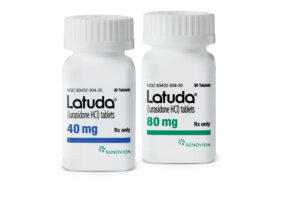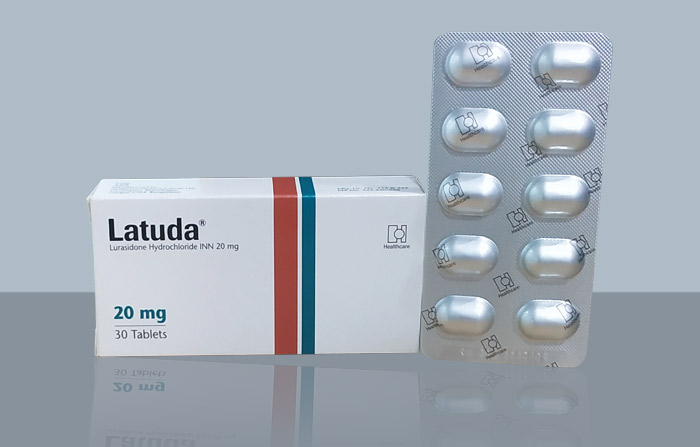Contents
- 1 What Is Latuda?
- 2 What Does Latuda Treat?
- 3 Alternatives Of Latuda
- 4 Lurasidone Side Effects
- 5 How To Take Latuda?
- 6 Main Brands Of Latuda
- 7 Who Shouldn’t Take Latuda?
- 8 Lurasidone/Latuda Warnings
- 9 Important Information About Lurasidone
- 10 What Should I Do If I Miss a Dose Of Lurasidone?
- 11 What Should I Avoid While Taking Latuda?
- 12 A Word From MantraCare
What Is Latuda?
 Latuda is an antipsychotic medication that is beneficial for treating schizophrenia. It works by blocking the action of dopamine in the brain. Latuda treats schizophrenia and bipolar disorder (manic depression) that other medicines fail to treat. The patient can consume Latuda with or without food, in the morning or evening. For schizophrenia, doctors suggest it once a day in the morning and for bipolar disorder 3 times a day (before breakfast, lunch, and dinner). It may take up to 4 weeks before you notice an improvement when taking lurasidone. You should continue taking it unless your doctor tells you otherwise.
Latuda is an antipsychotic medication that is beneficial for treating schizophrenia. It works by blocking the action of dopamine in the brain. Latuda treats schizophrenia and bipolar disorder (manic depression) that other medicines fail to treat. The patient can consume Latuda with or without food, in the morning or evening. For schizophrenia, doctors suggest it once a day in the morning and for bipolar disorder 3 times a day (before breakfast, lunch, and dinner). It may take up to 4 weeks before you notice an improvement when taking lurasidone. You should continue taking it unless your doctor tells you otherwise.
Latuda/Lurasidone is the newest treatment for adults with schizophrenia. Lurasidone is a once-daily oral medication, meaning it can be taken at home without fear of side effects or withdrawal problems that can occur with other antipsychotic medications. It also offers a convenient alternative to the long-acting injections that are currently common to treat schizophrenia. These benefits are due to its novel mechanism of action, which improves symptoms within hours instead of weeks.
What Does Latuda Treat?
 Latuda is used to treat a number of mental health conditions, most notably schizophrenia, and bipolar disorder. It works by blocking the action of dopamine in the brain, which is a chemical that is known to be overactive in people with these conditions. Latuda is known as a second-generation antipsychotic.
Latuda is used to treat a number of mental health conditions, most notably schizophrenia, and bipolar disorder. It works by blocking the action of dopamine in the brain, which is a chemical that is known to be overactive in people with these conditions. Latuda is known as a second-generation antipsychotic.
Schizophrenia is thought to occur due to overactivity in an area of the brain known as the dopamine pathways, which are responsible for creating thoughts and actions that we experience as emotions, as well as memory and movement coordination. In some people with schizophrenia, there is too much activity in these dopamine pathways, and the excess activity manifests itself in what we recognize as loss of touch with reality or psychosis.
Bipolar disorder, also known as manic depression, is a mental health condition characterized by moods that cycle between periods of mania (high energy/euphoria) and periods of depression (feeling sad or hopeless). People living with bipolar disorder experience these episodes of elevated and depressed moods. They are not able to function normally during episodes of mania, with symptoms including excessive energy, delusions, irritability/aggression, racing thoughts/speech, increased sex drive/ risky behavior, etc.
Lurasidone works by blocking the dopamine receptors in the brain which, over time, helps to reduce the psychotic symptoms of schizophrenia and the manic symptoms of bipolar disorder.
Alternatives Of Latuda
There are several other medicines used to treat these conditions as well that work in a similar way to lurasidone, such as Abilify (aripiprazole), Clozaril (clozapine), Geodon (ziprasidone), Saphris (asenapine), or Zyprexa (olanzapine).
Lurasidone Side Effects
Latuda is commonly associated with the following side effects, though not everyone will experience them:

- Drowsiness
- Headache
- Constipation
- Blurred vision
- Nausea
- Dry mouth
- Fatigue
- Muscle aches
Latuda may cause a serious, possibly fatal skin reaction. Symptoms include rash, severe itching, and blistering of the skin. If you have a fever in combination with a skin reaction, see a doctor immediately because this could be a sign of a condition called Stevens-Johnson Syndrome (SJS). SJS can be fatal. If you develop any skin reactions, tell your doctor right away.
Lurasidone is contraindicated in people with hypersensitivity to lurasidone or any of the ingredients included in Latuda. It should not be used if you are also taking a medicine that contains ritonavir (Norvir). For more information on this antipsychotic medication and precautions to take, speak with your pharmacist or doctor.
If these effects become troublesome speak to your doctor or pharmacist for advice. Do not drive until you know how lurasidone affects you and it is safe to do so. If you are feeling very unwell, especially if you have any of the following symptoms, seek medical advice urgently: thoughts of harming yourself or others.
A very serious allergic reaction to this drug is rare. However, seek immediate medical attention if you notice any symptoms of a severe allergic reaction, including rash, itching/swelling (especially of the face/tongue/throat), severe dizziness, trouble breathing.
Serious Effects Of Latuda
Other very serious side effects are rare. However, seek immediate medical attention if you notice any of the following symptoms: chest pain, muscle weakness, yellowing skin/eyes (jaundice), seizures/fits.
This medication may cause drowsiness or dizziness and so can affect your ability to drive or operate machinery safely. Do not drive or perform potentially hazardous tasks until you know how this medication affects you.
It is very important that pregnant women do not take lurasidone during the first 3 months of pregnancy or when breastfeeding unless absolutely necessary. Doctors also recommend that women who could become pregnant should have regular pregnancy tests while taking lurasidone. Especially in the first 3 months of treatment, and take contraception regularly during this time.
Side effects in the newborn baby may occur if lurasidone is taken near the time of delivery, so you should not take it for a least a month before giving birth. To avoid a potentially hazardous situation for your baby, you should use effective non-hormonal contraception while taking lurasidone and for at least 2 weeks after stopping the medication.
Children, teenagers, and young adults taking lurasidone should also be carefully monitored by their doctor especially during the first 6 months of treatment, or if treatment extends beyond 6 months.
How To Take Latuda?

Lurasidone comes in tablet form and you should swallow it once a day with a meal, either in the morning or evening. The ideal recommendation is to take Latuda at the same time each day.
Make sure that your doctor knows about any food or medication allergies before starting treatment with lurasidone. Also, tell your doctor if you have a history of seizures and/or blood pressure problems and if you are experiencing muscle twitching, spasms, or stiffness.
If you miss a dose of Latuda take it as soon as possible if less than 12hrs before the next dose is due, but do not take 2 doses at once to make up for missed ones.
Do not stop taking lurasidone without informing your doctor first.
If you get any side effects or notice anything unusual, stop taking lurasidone and speak with your doctor. Also, before starting treatment it is important that your doctor knows about your health history (especially if there are or have been any of the following): diabetes, heart disease, seizures, blood pressure problems.
You should not use it if you have low blood pressure or high blood sugar. Or if you have recently got treatment for Parkinson’s disease with an antiparkinsonian agent, have narrow-angle glaucoma, or have a history of breast cancer.
Main Brands Of Latuda
The main manufacturers of Latuda are Sunovion Pharmaceuticals. Other brands include Lutathera, Lutrevia.
Tablets made by Sunovion Pharmaceuticals 20mg – white, round shape 30mg – white, round shape 40mg – white, round shape 50mg – yellowish-green, round shape 60mg – light yellow (take Latuda alongside food, mealtime should not exceed 11hrs).
Please consult your doctor for proper dosing and use of this medication.
Who Shouldn’t Take Latuda?
 You should not take if you have-
You should not take if you have-
- Uncontrolled narrow-angle glaucoma, are allergic to it
- Has low blood pressure or high blood sugar levels
- Has any other risk factors for heart disease including being over 35 years old
- Have a family history of heart disease, or are taking any other medications that may affect your heart.
Latuda is not recommended for use in children and young adults under the age of 18 years. It may increase the risk of suicidal thoughts and behaviors (suicidality) in this age group. If you are concerned about this, speak to your doctor immediately.
If you notice any changes in mood or behavior that concern you, speak to your doctor.
A person should avoid Latuda certain medications (e.g. monoamine oxidase inhibitors – MAOIs). As it may cause serious effects while interacting with other medications (e.g. quinidine, pimozide). You should tell your doctor about all the prescription and non-prescription medications you are taking before starting treatment with Latuda.
Lurasidone/Latuda Warnings
You should not take it if you are allergic to lurasidone or any of the other ingredients in it. Children under 18 years old should not take this medicine. You should use caution when driving or operating machinery or doing anything that requires you to be alert. Until you know how the medication affects you.
Those with heart disease should take it regularly for the shortest length of time possible to avoid putting themselves at risk of developing problems such as heart attacks, stroke, and sudden death.
You should seek medical assistance if you experience any signs of an allergic reaction such as swelling of your face, throat, or tongue. Also seek medical help if you experience symptoms such as chest pain, shortness of breath, and irregular heartbeats.
Things To Discuss With My Doctor Before Taking Lurasidone?
Before taking Latuda, you should talk to your doctor about what medication you are currently taking, if you have any pre-existing conditions, and whether or not you are pregnant. You should also talk to your doctor about any symptoms that may be affecting your mood or behavior.
If you have or have had any of the following, you should let your doctor know before starting treatment:
- Liver problems (including hepatitis)
- Kidney problems
- Mental health problems such as schizophrenia or bipolar disorder (manic depression) or psychosis (hearing voices and seeing things that are not there)
- Low blood pressure or high blood sugar
- Heart problems
- Seizures
- Thyroid problems
You should also inform your doctor if you are sensitive to medication that contains lactose (a carbohydrate found in milk products) so they can prescribe an alternative medication for you.
Important Information About Lurasidone
Latuda can cause serious side effects. You should contact your doctor immediately if you experience any of the following symptoms:

- Fainting
- Fast heartbeat
- Fever
- Joint pain
- Muscle stiffness or weakness (myasthenia gravis)
- Changes in thoughts or behavior including suicidal thoughts and actions
- Trouble swallowing or breathing
- Uncontrolled movements of your tongue, lips, or jaw (tardive dyskinesia)
If you experience any of the following symptoms seek medical assistance immediately: seizures, fever, muscle rigidity, and confusion.
People with schizophrenia and bipolar I disorder who does not find other medications suitable for these conditions in the past can use this medicine. Using it with certain medications may cause serious unwanted effects when taken with other medications.
A patient should not stop taking it suddenly without telling your doctor. As this could cause unpleasant withdrawal symptoms. The patient should only stop taking it if the doctor says so.
What Should I Do If I Miss a Dose Of Lurasidone?
 Take your missed dose as soon as you remember it. However, if it is almost time for the next dose, skip the missed one and return to your regular schedule.
Take your missed dose as soon as you remember it. However, if it is almost time for the next dose, skip the missed one and return to your regular schedule.
Do not take a double dose – unless your doctor tells you to. If you miss more than 2 doses or if you have been taking this medication regularly for several weeks and miss a dose. Then contact your doctor as soon as possible.
What Should I Avoid While Taking Latuda?
You should avoid driving a car or operating machinery if you feel drowsy or dizzy. You should also avoid standing up too quickly, as it may make you feel faint, dizzy, or lightheaded. Also, try to avoid overheating from excess clothing and strenuous activity. This may cause you to feel faint, dizzy, or lightheaded.
A Word From MantraCare
Your mental health — your psychological, emotional, and social well-being — has an impact on every aspect of your life. Positive mental health essentially allows you to effectively deal with life’s everyday challenges.
If you are looking for affordable Online Counseling MantraCare can help: Book a trial therapy session


